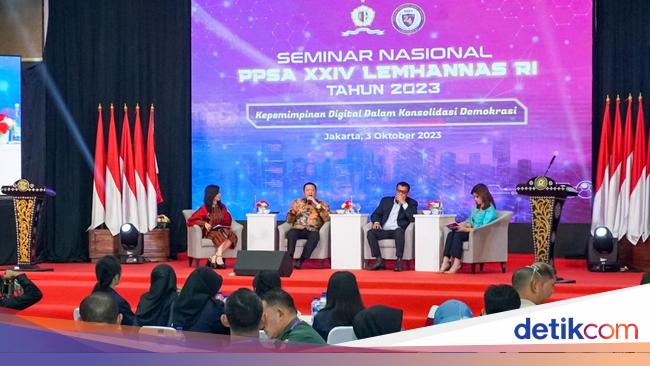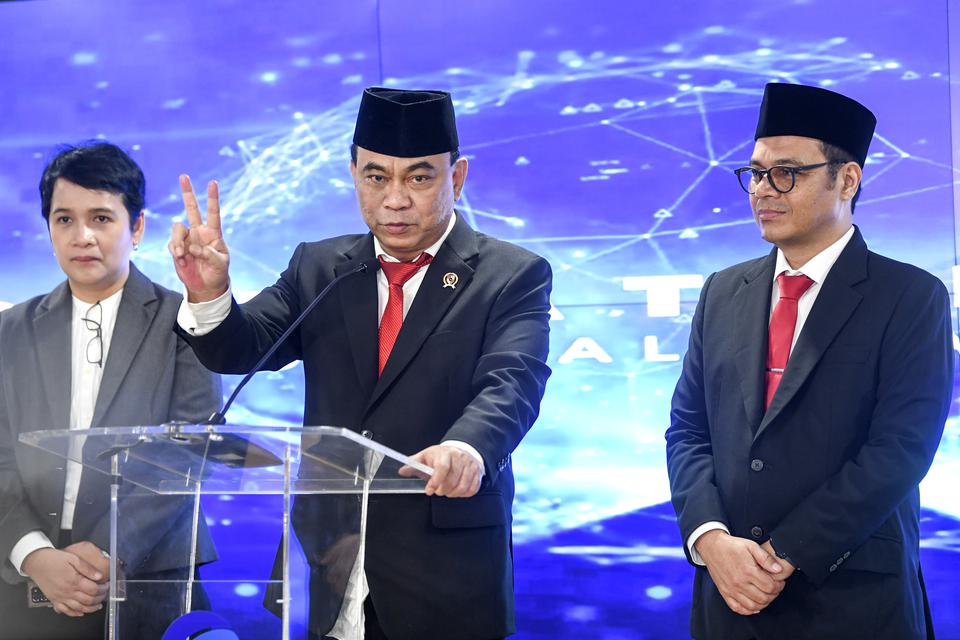Jakarta –
Chairman of the Indonesian People’s Consultative Assembly Bambang Soesatyo said that the concept of digital leadership in government is very important. The aim is to improve public services, transparency and operational efficiency of government.
According to him, government leaders must formulate a comprehensive digital strategy including objectives, priorities and initiatives to use information technology, so that they can provide better services to the community. This strategy must be aligned with the broader mission and vision of the government.
According to Bamsoet, the use of information technology will also make it easier for government institutions to collect, analyze and use data to make the right decisions.
“Data analysis can help identify areas that need improvement, track performance, and allocate resources more efficiently. Additionally, in the future, algorithm technology will become more sophisticated to record various events through various social media platforms,” Bamsoet said in his statement: Tuesday (03/10/2023).
He conveyed this when he was a speaker at the 24th Lemhannas RI Short Education Program (PPSA) Seminar titled “Digital Leadership Roadmap to Achieve the Vision of Democratic Consolidation,” in Jakarta, Tuesday (10/ 03/23).
The Golkar Party Deputy General Chairman emphasized that Indonesia should not be left behind, like several countries that have started building metaverse cities as a means of public service. Examples of such cities include Seoul, South Korea, Dubai, Singapore, and Santa Monica, California, United States.
Bamsoet explained that digital leadership has been proven to facilitate the improvement of public services through modern channels. This includes creating easy-to-use websites and mobile applications, enabling online requests for services and transactions, and providing digital self-service options to citizens.
But on the other hand, there is a demand for transparency and openness of data. It is also considered that digital leadership will certainly face a digital society that is generally several steps ahead. There are also requirements for transparency in government data and information.
“To meet these demands, many modern government leaders have been able to create open data portals, publish government spending data, and give the public access to public records,” Bamsoet said.
Apart from that, Bamsoet also explained that Indonesia should also have the courage to implement digital elections that are more efficient, cheaper, easier and faster. There are three types of electronic voting, namely optical voting, direct registration and Internet voting.
“Optical scanning or optical scanning voting uses bales of paper that are marked by voters. The paper then passes through a scanner to be counted digitally. This system is similar to the conventional voting method applied in Indonesia. The difference is that the vote counting is carried out automatically so that the voting results “are published more quickly. Direct registration and Internet voting no longer use paper ballots. The entire electoral process is carried out digitally, from voice recording, storage and processing,” explained Bamsoet.
According to Bamsoet, several countries have adopted electronic voting, such as Canada since the 1990s, as well as Estonia, the Netherlands, Germany and the Philippines. However, the Netherlands and Germany experienced failures in this system and did not continue to operate it because it was vulnerable to possible hacks. As a successful example, the Philippines continues to use the Automated Election System (AES) and has attracted worldwide attention.
He explained that digital portals are also often used as platforms to interact with the public, collect their feedback and involve them in the policy-making process.
Social media, online forums, and innovations such as “virtual town halls” have often been used as effective tools to encourage citizen participation in modern government management.
“All of this must continue to be improved, particularly to ensure that digital services are accessible to all citizens, including people with disabilities and marginalized communities. This requires strengthening the infrastructure of digital services by considering accessibility and providing digital literacy programs,” explained Bamsoet.
He also added that according to the results of a survey conducted by the Ministry of KOMINFO and the Katadata Insight Center, Indonesia’s digital culture status during the period 2020 to 2022 continues to increase. Successively from 3.46 points, it rose to 3.49 points, then again to 3.54 points.
On the other hand, INDEF estimates that currently the literacy level in Indonesia is still around 62 percent. The lowest compared to other ASEAN countries, which averages 70 percent.
“Faced with this situation, the government need not hesitate to invest in increasing the capacity of the state apparatus, to ensure that it has the digital skills needed to work effectively in the era modern. pay attention to cybersecurity and data privacy to protect sensitive information “of government and citizen data. Digital leadership must be accompanied by the development of strong cybersecurity policies, regular security audits and strengthening of capabilities of the state apparatus regarding cybersecurity best practices,” Bamsoet concluded.
For your information, those present at the event included LEMHANNAS Governor Andi Widjajanto, Chairman of the Senate for the 24th Short Education Program (PPSA) of Lemhannas RI, Brigadier General Pol Chaidir, as well as participants of the 24th Lemhannas RI Short Education Program (PPSA).
(anl/ega)

“Travel nerd. Social media evangelist. Zombie junkie. Total creator. Avid webaholic. Friend of animals everywhere. Future teen idol.”






